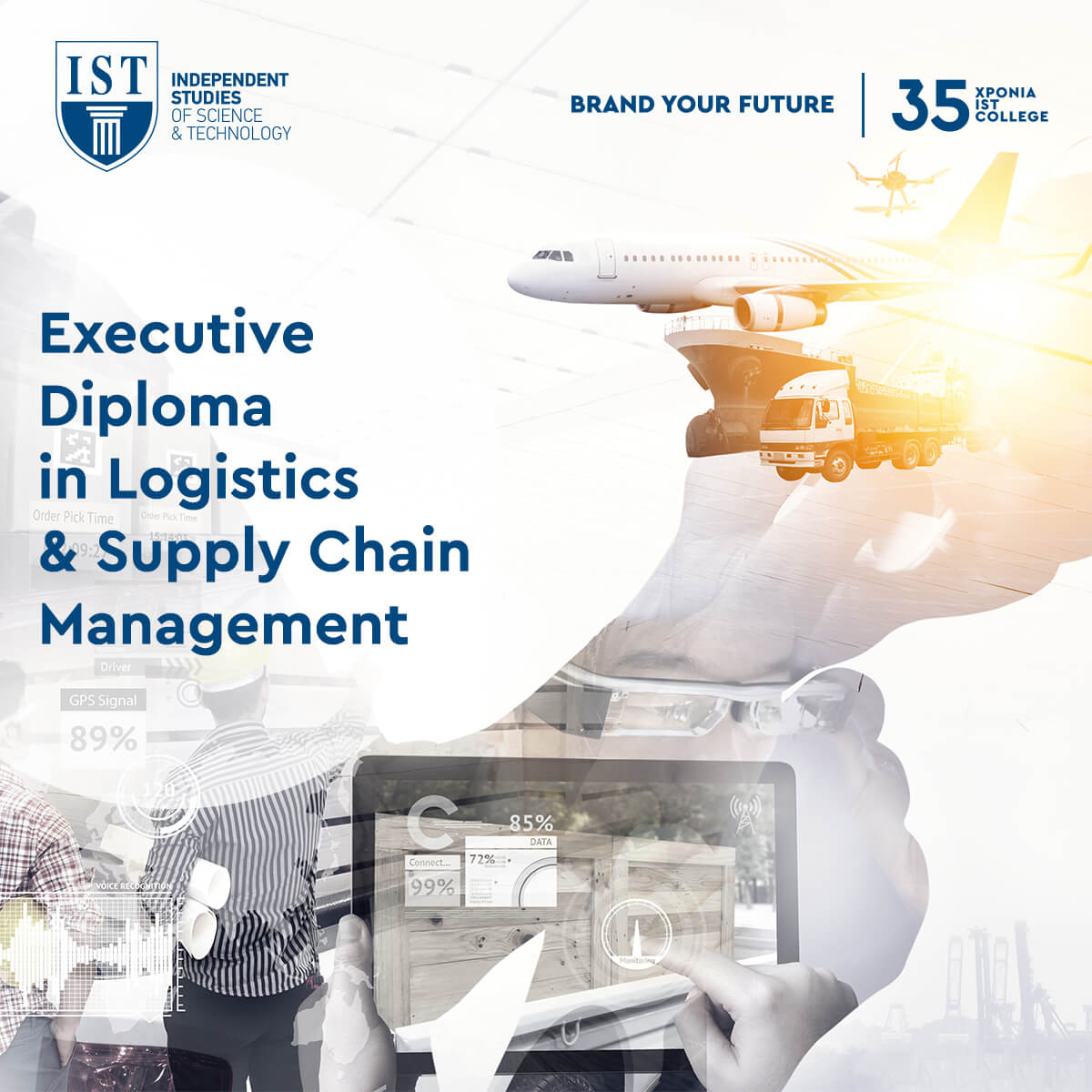
Duration
68 hours
Μοde of Delivery
Online & On demand
Language of Delivery
Greek
Start Date
27 March 2026
Location
Athens, Greece

Description
The Logistics industry is experiencing continuous growth, as it is a vital sector for the smooth operation, profitability and good image of a business. The supply chain consists of all those businesses and organizations that are necessary for a product to reach the final customer. The effective organization, coordination and management of the flow of products and information in this chain is the subject of Logistics.
Objectives of the programme
The aim of the Executive Diploma in Logistics & Supply Chain Management is to offer practical and specialized knowledge which follows the needs of the modern labor market. The program will help you upgrade your knowledge, strengthen your position in the company where you work so that you can develop hierarchically and also develop your skills for all those who want to start working in the supply chain field.
The programme, in addition to the theoretical knowledge it provides, includes at all stages of the supply chain analysis of modern case studies, practical applications and exercises which are constantly renewed.
In addition to the basic principles, Logistics uses dynamic algorithms and operational research models for the greatest possible accuracy and efficiency of decisions. Extensive use of Excel is made, and basic principles of Project Management focused on the correct and immediate movement of stocks to the final destination are also taught.
Upon completion of the programme you will have acquired practical knowledge:
- Basic costing principles and inventory valuation methods, directly and practically applied to each company.
- The concept of warehouse, cargo, container.
- Route costing, cost of fuel, driver, cost of various modes of transport.
- Basic principles from Transport Economics.
- In addition, the seminar “borrows” elements from business research and statistics, for forecasting demand, seasonality, emergency orders, correlation of factors, with immediate practical application.
- Issues of choosing appropriate distribution channels are also analyzed depending on the type, type and purpose of the business. In addition, Incoterms are explained.
Monitoring Benefits
Upon completion of the programme you will be able to:
- Develop skills and expand your knowledge in the field of supply chain. You will learn about inventory management, transportation, distribution and other related topics.
- Improve your efficiency and effectiveness as you will be able to identify and implement process improvements that can help your organization achieve cost savings, increased customer satisfaction and improved performance.
- Improve your career prospects and professional development, through promotions or new employment opportunities in your organization or industry.
- Gain a competitive advantage over other candidates in the job market.
- Develop your network of contacts (Networking) with other professionals in the Logistics industry and build relationships that can be useful in your career
Who it is addressed to
The Executive Diploma in Logistics & Supply Chain Management is addressed to warehouse managers, purchase decision departments, procurement departments, departments and supply centers in public organizations, to entrepreneurs who wish to significantly improve the efficiency of distribution, maintenance and inventory retention (of products, materials , goods, raw materials, consumables, building and construction items, etc.).
It also gives a significant comparative advantage to food and catering businesses, hotel units, shipping companies, courier companies, shipping companies. It is also aimed at supermarkets and large supply organizations.
A large part of Logistics also concerns service companies, both for the supply of the materials and equipment that support the service, but also for the human resources that are the main productive factor of service provision.
Lecturers
Structure
Modes of Delivery
- Online: the monitoring of the programme can be done fully online in real time, having access to the courses and content of the programme is possible in real-time through the easy-to-use and modern platform of IST College.
- On-Demand: The programme offers the possibility of on-demand attendance. This means that you will have access to video-recorded lessons that you can watch or refer to during the course. This means that you can access video lectures during the training.
- Mixed : Create your own flexible study schedule using any of the above tracking modes in combination.
Certification
The Diploma is certified for the quality of its subject matter, its lecturers, the way students are evaluated, but also the quality of its material, with the Expert level QualityTrainingLabel scheme from ACTA – Technovlastos of the Aristotle University of Thessaloniki.
You may also be interested in:
“Practical Leadership Skills” is a hands-on leadership development programme that equips managers and professionals with scientifically grounded, practical tools to enhance their effectiveness, confidence, and impact in everyday team and organizational management.
Business & Economics,Seminar
The Executive Diploma in SMEs & Family Business Management has been designed to provide entrepreneurs and executives with practical tools, strategic thinking, and structured solutions, enabling them to develop, safeguard, modernize, and properly transfer their business.
Business & Economics,Diploma
In the “Digital & AI Skills for Professionals” seminar, participants develop digital and AI skills, gain an introduction to the legal aspects of the digital era, and learn to use these technologies safely online, acquiring essential cybersecurity knowledge.
Business & Economics,Seminar
“Practical Leadership Skills” is a hands-on leadership development programme that equips managers and professionals with scientifically grounded, practical tools to enhance their effectiveness, confidence, and impact in everyday team and organizational management.
Business & Economics,Seminar
The Executive Diploma in SMEs & Family Business Management has been designed to provide entrepreneurs and executives with practical tools, strategic thinking, and structured solutions, enabling them to develop, safeguard, modernize, and properly transfer their business.
Business & Economics,Diploma



